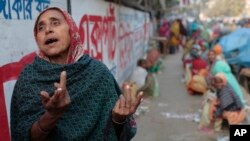For the past eight weeks in Bangladesh, more than 100 people have died in bomb attacks on public vehicles and alleged police shoot-outs, as the opposition Bangladesh Nationalist Party (BNP) and its allies continue a nation-wide transportation blockade.
BNP chairperson Khaleda Zia insists that the blockades will continue until prime minister Sheikh Hasina resigns and calls for national elections.
With the government refusing to hold elections until its present term ends in 2019 and Hasina announcing that she will not sit for dialogue with the Zia-led alliance that she calls “terrorists and murderers,” there appears to be no end to the political impasse.
Last week, a Bangladeshi court issued an arrest warrant for the main opposition leader, former prime minister Zia, in connection with two corruption cases, which will likely intensify anti-government protests
Another Impasse Between the ‘Battling Begums’
Politics in Bangladesh, which has been ruled by either Hasina or Zia for nearly 24 years, has been known for the feuding between the two powerful political leaders who have often been called as “battling begums.”
The nickname “begum” is a term of respect for Muslim women. But their feud, which stems from a bitter personal rivalry, has spun Bangladesh into near anarchy at times in recent decades.
The latest violence involves the BNP-led 20-party alliance of opposition groups blockading roads, railways and waterways since January 6. Government supporters have worked to defy them.
Gasoline bomb attacks have hit hundreds of vehicles. The government blames the BNP activists and their allies.
Enam Ahmed Chaudhury, an advisor to Zia, refuted the charge.
“BNP is not definitely responsible for these attacks. Political parties should not be held responsible for this. It's the anarchists, it's the trouble-mongers, it's the saboteurs, who are responsible for the attacks,” Chaudhury told VOA.
The blockade and violence is badly hampering the country's economic prospects, said Iftekhar Zaman, executive director of Transparency International Bangladesh.
“People's lives are actually hostage to this whole conflict and this is affecting every aspect of the citizens' lives, particularly starting from the fundamental right to life of the people to also even the right to natural death has been captured by the violence. Daily economic life of the citizens of the country- the factories, industries are all suffering,” Zaman said.
Continuing Fallout from Flawed 2014 Election
The unrest in Bangladesh began on January 3, when the government barred the opposition from holding a protest rally around the first anniversary of Hasina’s disputed re-election last year.
Hasina’s 2014 victory came after the BNP and its allies boycotted the polls, claiming that the vote would be rigged.
The European Union and the United States also refused to send observers to the polls over concerns about their legitimacy. In the end, only about 20% of the voters reportedly cast their votes - a steep fall from the 87% turnout in previous general elections in 2008. On the day of the vote, at least 19 people were killed in violence.
A day after the elections, a U.S. State department statement said the results did not “appear to credibly express the will of the Bangladeshi people."
Hours after she was confirmed the winner, the prime minister said that fresh elections could “happen any time,” following a “proper dialogue” with the opposition.
Those talks never happened. More than a year later, amid a surge in attacks, Hasina said there would not be any dialogue with “terrorists and murderers.”
In a sign of the divisions, Hasina's media advisor, Iqbal Sobhan Chowdhury, compares the opposition to the Islamic State terrorist group.
“Their actions cannot be part of a democratic movement and it has no support from the people. They are in effort to get at power by burning people to death, exactly the way IS and Taliban are seeking to establish their control by killing innocent people, including children,” Chowdhury said to VOA.
Amid Chaos of Street Attacks, Dwindling Hopes for Justice
While most attacks have been blamed on the opposition activists, there have been local media reports of allies of the ruling Awami League and its youth wing Jubo League arrested with gasoline bombs. Many also claim that security agencies are contributing to the violence.
“All the sides are involved in it. The pro-government activists, the pro-opposition activists... and also the allegation is that various agencies who are supported by the state are involved in this. So, it's not only this side or that side- all are involved in this petrol bomb kind of violence,” said Adilur Rahman Khan, secretary of Dhaka-based human rights group Odhikar.
Asif Nazrul, a professor of law at Dhaka University said there is little hope of determining who is responsible in the current political climate.
“We still don't know who are the terrorists and who are the murderers. We have seen that BNP-Jamaat men have been caught with petrol bombs. We have also seen news that Awami League people were caught with petrol bombs. Unless and until it had been proved by a proper judicial system we cannot come to a conclusion which party is a terrorist organization,” Nazrul said.
Opposition leader Zia has insisted the blockade will continue until the government is ready to meet the key demands of talking with opposition leaders and preparing for fresh elections.
Transparency International Bangladesh’s Iftekhar Zaman said dialogue is the way forward, but he is not hopeful.
“The only way to move to dialogue is at least a few positive steps on the part of either party. It's basically to pause for a moment and detach themselves from the violent course and a take a few positive and constructive actions so that a condition for dialogue is created,” he said.
Zaman said that in the current circumstances, he does not see that happening.







